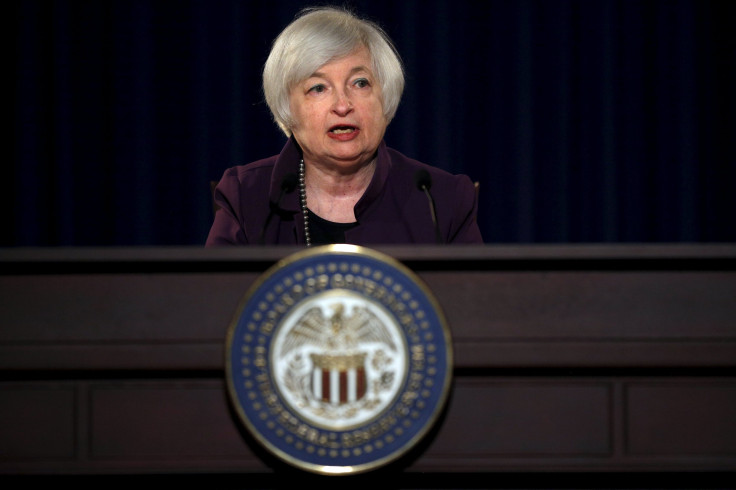Federal Reserve System: Why Greece, China And Puerto Rico Could Prevent The FOMC From Raising Rates In 2015

Even before Greeks voted to reject bailout proposals from the country’s creditors and China’s stock market began to tumble this week, the U.S. Federal Reserve was questioning its stance on an interest rate increase planned for sometime later in 2015. At the Federal Open Market Committee meeting on June 16 and 17, officials wondered whether a hike would be “premature” in the face of uncertainty in Greece and China, according to minutes from meeting released Wednesday.
Many participants expressed concern that if Greece failed to resolve its differences with creditors, the standoff could result in disruptions in financial markets in the eurozone, with possible spillover effects in the United States, the statement said. Policy makers were also concerned about stock prices declining in China while the Greek drama continued to unfold.
Although most economists had expected that the U.S. central bank would raise interest rates as early as September, an increasing number of economy watchers now say it's possible the Fed may rethink its plan in light of recent world-changing developments. Economists point to Greece’s protracted bailout negotiations and the increasing volatility in China’s stock market, but also to Puerto Rico’s battle to avoid bankruptcy.
“Any uncertainty in the global environment is going to make the Federal Reserve less likely to raise rates,” said Ian Winer, director of equity trading for Wedbush Securities.
Srinivas Thiruvadanthai, director of research at the Jerome Levy Forecasting center, says the Fed may hold off on raising rates through all of 2015. “The situation in Greece doesn’t help because it reduces the odds even further,” Thiruvadanthai said. He notes that global events may even prevent Fed action on rates through all of 2016 as well.
The Greek drama was concerning enough, but in recent weeks, Asian markets have seen bouts of extreme volatility, with the Shanghai Stock Exchange Composite index tumbling more than 30 percent from its peak in mid-June.
Of the 2,800 companies listed on the Shanghai index, a quarter of them have filed for a trading halt at Mondays’ close. “There seems to be quite a bit of nervousness from traders,” said Lennon Sweeting, a corporate dealer at USForex Inc. “If you compared that to a stock market crash, it goes probably back to the crash in the U.S. in 1929 that lead to the Great Depression. There’s really not much to compare it to in modern-day markets.”
Sweeting said the volatility in China’s stock market will likely drive U.S. dollar strength, which isn't exactly good news for American corporate bottom lines. The robust dollar is a huge drag on growth for the benchmark S&P 500, because the index’s companies derive more than 40 percent of their revenue overseas.
Puerto Rico will certainly be on the Fed’s radar going forward. The unincorporated U.S. territory, officially a commonwealth, is struggling with a mounting debt load of nearly $72 billion, which it says it is unable to pay.
“Puerto Rico is a huge problem for the U.S., if they were to go bankrupt, because it would disrupt the municipal bond market here,” said Peter Cardillo, chief market economist at Rockwell Global Capital.
Puerto Rico cannot file for Chapter 9 bankruptcy as Detroit did in 2013 because of its commonwealth status. “What Detroit didn’t do, Puerto Rico will, and that would cause a lot of havoc here in the states.”
© Copyright IBTimes 2024. All rights reserved.












